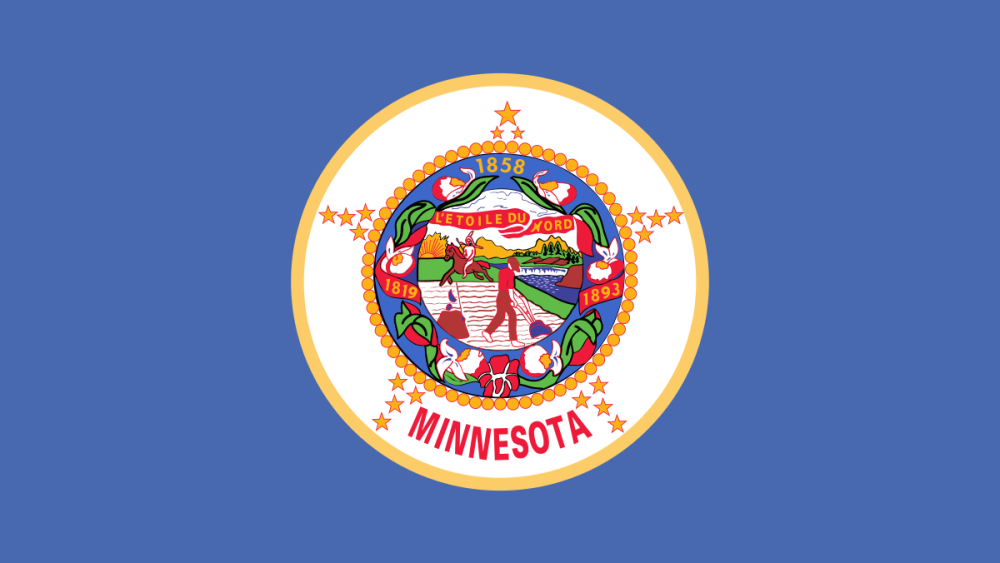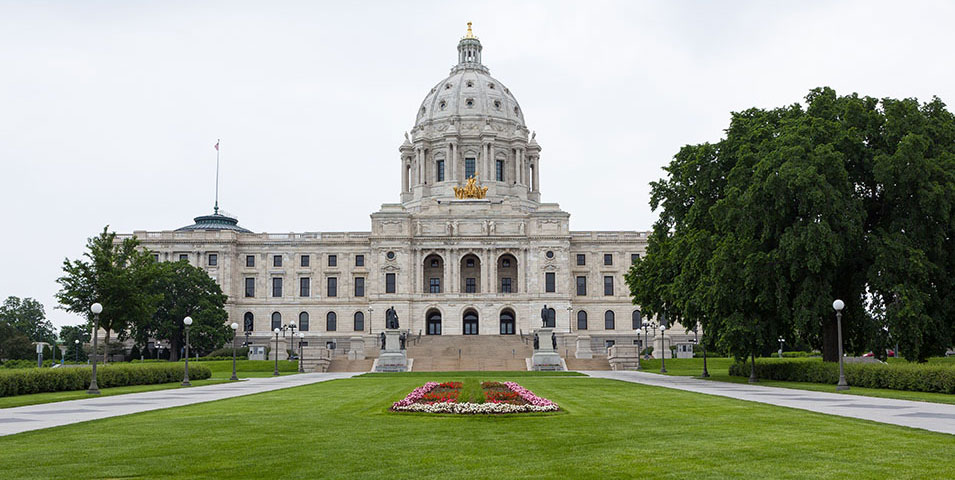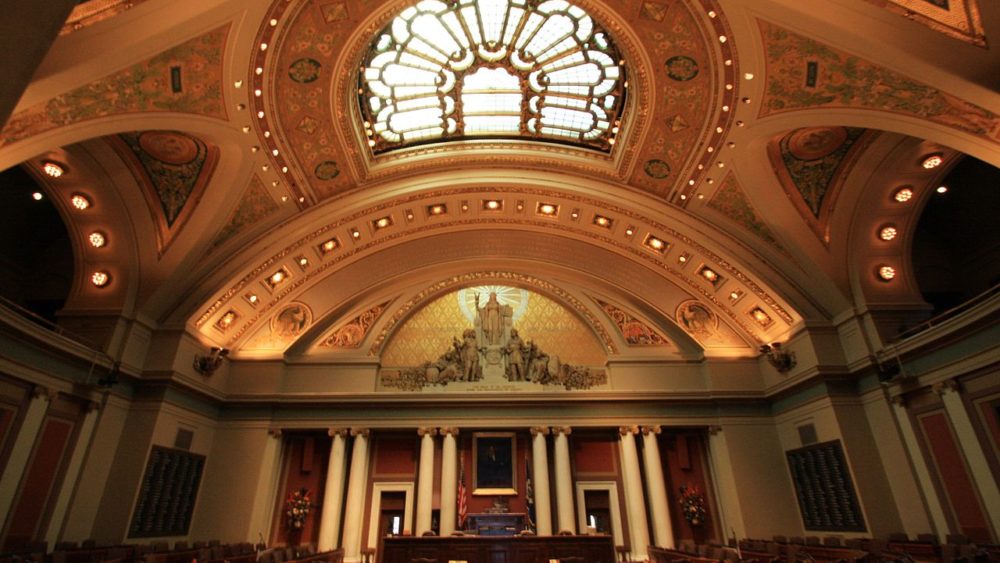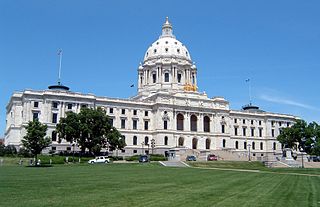May 25, 2022 •
Minnesota Legislature Adjourns Sine Die

Flag of Minnesota
The 92nd session of the Minnesota Legislature adjourned sine die on May 23 without passing most of the tax and spending bills. A special session is expected to be called by the governor in hopes of reaching an agreement on […]
The 92nd session of the Minnesota Legislature adjourned sine die on May 23 without passing most of the tax and spending bills.
A special session is expected to be called by the governor in hopes of reaching an agreement on several funding bills that also contain key policy provisions.
The two-year biennial budget was passed last year, funding state operations until June 30, 2023, so there is no risk of a government shutdown.
June 15, 2021 •
Minnesota Legislature Returns for Special Session

Minnesota Capitol Building
On June 14, the Minnesota Legislature returned to the capitol for a special session. In this session, lawmakers will be finalizing a two-year, $52 billion budget before the start of the next fiscal period July 1. If the legislature fails […]
On June 14, the Minnesota Legislature returned to the capitol for a special session.
In this session, lawmakers will be finalizing a two-year, $52 billion budget before the start of the next fiscal period July 1.
If the legislature fails to pass a budget before July 1, there will be a government shutdown.
May 20, 2021 •
Minnesota Adjourns Sine Die

Minnesota Capitol Building
The Minnesota Legislature adjourned sine die on May 17, although work is not finished. Lawmakers reached a bipartisan budget agreement on numbers only, with details to be worked out at a special session in June. Both chambers expect to be […]
The Minnesota Legislature adjourned sine die on May 17, although work is not finished.
Lawmakers reached a bipartisan budget agreement on numbers only, with details to be worked out at a special session in June.
Both chambers expect to be back in a special session on June 14 when Gov. Walz’s current declaration of a Peacetime Emergency ends.
If Walz wants to extend the emergency declaration again, he is obligated by law to call a special session to give both chambers the right to rescind his declaration by a majority vote.
If the budget bills are not passed and signed into law by July 1, there will be a government shutdown, which has happened twice before.

Gov Tim Walz, with Lt Gov Peggy Flanagan - by Lorie Shaull
Gov. Tim Walz announced on July 7, he intends to call lawmakers back for an open-ended session beginning July 13. Walz stated the session will coincide with the 30-day extension of the peacetime emergency ending July 12, and added that […]
Gov. Tim Walz announced on July 7, he intends to call lawmakers back for an open-ended session beginning July 13.
Walz stated the session will coincide with the 30-day extension of the peacetime emergency ending July 12, and added that other issues should get top billing.
Walz is obligated by law to call a special session for the Legislature to approve the emergency declaration.
The Senate tried to revoke the governor’s executive power during the first special session ending June 19.
However, the attempt failed because it requires the vote of both chambers.
In the first special session, no deals were reached on legislation both parties said was necessary and everything will be on the agenda again.
The Legislature will determine the length of the session.
June 11, 2020 •
Gov. Walz Calls Special Session of Minnesota Legislature

Gov Tim Walz, with Lt Gov Peggy Flanagan - by Lorie Shaull
Gov. Tim Walz called a special session which will begin June 12. The primary purpose of the session will be to extend the COVID-19 peacetime emergency by 30 days, making sure the state can quickly respond to the pandemic. The […]
Gov. Tim Walz called a special session which will begin June 12.
The primary purpose of the session will be to extend the COVID-19 peacetime emergency by 30 days, making sure the state can quickly respond to the pandemic.
The House and Senate adjourned sine die on May 18, marking the end of the 2020 legislative session.
However, unfinished business and recent protests have added to the agenda.
Walz is obligated by law to call a special session for the Legislature to approve the emergency declaration.
Although, the length of the session will be determined by the Legislature.
May 19, 2020 •
Minnesota Legislature Adjourns Sine Die

Minnesota House Chamber - Chris Gaukel [CC BY-SA 2.0 (https://creativecommons.org/licenses/by-sa/2.0)]
The Minnesota Legislature left much unfinished when it adjourned sine die on May 18 as required by the constitution. Both chambers expect to be back in a special session on June 12 when Gov. Walz’s current declaration of a Peacetime […]
The Minnesota Legislature left much unfinished when it adjourned sine die on May 18 as required by the constitution.
Both chambers expect to be back in a special session on June 12 when Gov. Walz’s current declaration of a Peacetime Emergency ends.
If Walz wants to extend the emergency declaration again, he is obligated by law to call a special session to give both chambers the right to rescind his declaration by a majority vote.
Although Walz calls the session, the legislative branch decides when it ends.
This also takes away the governor’s power to set the agenda for the special session.
Most of the bills passed were in response to the COVID-19 pandemic.
Additionally, a Select Committee on Minnesota’s Pandemic Response and Rebuilding was formed to allow the House to continue conversations about the pandemic after wrapping up its regular legislative session.
March 25, 2020 •
Minnesota Lawmakers Scheduled to Convene March 26

Minnesota House Chamber - Chris Gaukel [CC BY-SA 2.0 (https://creativecommons.org/licenses/by-sa/2.0)]
On March 26, Minnesota lawmakers are scheduled to convene to act on legislation to help the state combat the COVID-19 pandemic. Legislators were last in session on March 17, when members passed a $200 million relief package to help health care providers battle the pandemic. That […]
On March 26, Minnesota lawmakers are scheduled to convene to act on legislation to help the state combat the COVID-19 pandemic.
Legislators were last in session on March 17, when members passed a $200 million relief package to help health care providers battle the pandemic.
That bill was signed by Gov. Tim Walz the same day.
House Speaker Melissa Hortman said the new proposed legislation will provide further relief than the governor is able to deliver via executive order.
Lawmakers had agreed to recess until April 14, with the understanding they would return as needed.
Arrangements are being made to ensure the legislature follows the Minnesota Department of Health guidelines.
Specifically they look to keep members, staff and the public safe, Hortman and Senate Majority Leader Paul Gazelka said in a joint statement late Tuesday.
This does not affect lobbyist reporting.

Minnesota Capitol Building
Minnesota’s one-day special session ended early Saturday morning. The session ended with the legislature passing a $48 billion budget to fund the government for the next two years. The outline of the budget was agreed to during the regular session, […]
Minnesota’s one-day special session ended early Saturday morning.
The session ended with the legislature passing a $48 billion budget to fund the government for the next two years.
The outline of the budget was agreed to during the regular session, which ended on May 20 after reaching the maximum number of days the state’s constitution permitted.
A budget deal needed to be finalized by July 1 to avert a shutdown.
March 21, 2019 •
Minnesota Legislators Introduce Several Ethics Bills
The Minnesota Legislature recently introduced several ethics-related bills during the 91st legislative session. Senate File 2041 requires public officials to disclose a lobbyist, principal, or other interested person by whom the individual is compensated in excess of $50 in any […]
 The Minnesota Legislature recently introduced several ethics-related bills during the 91st legislative session.
The Minnesota Legislature recently introduced several ethics-related bills during the 91st legislative session.
Senate File 2041 requires public officials to disclose a lobbyist, principal, or other interested person by whom the individual is compensated in excess of $50 in any month for providing services as an independent contractor or consultant.
Additionally, the bill requires both lobbyists and principals to disclose political contributions. If passed, Senate File 2041 will become effective the day following enactment.
Senate File 2039 seeks to prohibit legislators, constitutional officers, commissioners, deputy commissions, assistant commissioners, or heads of any state department or agency from lobbying for seven years after leaving the aforementioned offices or positions.
House File 2391 seeks to prohibit former legislators and certain legislative employees from lobbying the legislature for two years after leaving legislative office or separation from employment.
Senate File 2035 creates a conflict of interest when a legislator or constitutional officer accepts a contribution of more than $500 from a lobbyist, principal, political committee, or political fund with regard to an action coming before the officer when the contributing individual or association has a greater financial interest of greater consequence to the contributor than the general interest of other residents or taxpayers of the state.
If a conflict arises, the covered official must disclose the conflict.
May 21, 2018 •
Minnesota Legislature Adjourns Sine Die
The Minnesota Legislature adjourned sine die on May 20, 2018. The Legislature passed bills relating to misrepresenting service animals, prohibiting local governments from disarming police officers, and funding for the state’s vehicle license and registration system. Tensions between the Republican-controlled […]
 The Minnesota Legislature adjourned sine die on May 20, 2018.
The Minnesota Legislature adjourned sine die on May 20, 2018.
The Legislature passed bills relating to misrepresenting service animals, prohibiting local governments from disarming police officers, and funding for the state’s vehicle license and registration system.
Tensions between the Republican-controlled House and Democrat Gov. Mark Dayton were apparent during the final day of the session as Republicans sent a series of bills to Dayton similar to previously vetoed bills.
Dayton has reiterated he will not call a special session for any unfinished business.
May 23, 2017 •
Minnesota Adjourns and Immediately Begins Special Session
The 2017 Minnesota regular legislative session adjourned late on Monday, May 22, 2017. The legislators failed to pass a $46 billion spending package. As a result, the Legislature immediately entered into a special session at 12:01 a.m., on May 23, […]
 The 2017 Minnesota regular legislative session adjourned late on Monday, May 22, 2017.
The 2017 Minnesota regular legislative session adjourned late on Monday, May 22, 2017.
The legislators failed to pass a $46 billion spending package. As a result, the Legislature immediately entered into a special session at 12:01 a.m., on May 23, 2017.
The special session is expected to end on May 24, 2017.
May 23, 2016 •
Minnesota Legislature Adjourns Sine Die
The Legislature adjourned sine die at midnight after a long day on Sunday, May 23. Prior to adjournment, $260 million of a $900 million budget surplus was allotted to tax credits and cuts for parents, farmers, businesses, and college students. […]
 The Legislature adjourned sine die at midnight after a long day on Sunday, May 23.
The Legislature adjourned sine die at midnight after a long day on Sunday, May 23.
Prior to adjournment, $260 million of a $900 million budget surplus was allotted to tax credits and cuts for parents, farmers, businesses, and college students. Lawmakers also passed extra spending measures for broadband internet infrastructure development and a statewide voluntary preschool program. Despite several last minute efforts, the Legislature could not come to agreement on a bonding bill to fund construction and transportation projects prior to the end of the session.
A special session could be called soon to address the bonding bill.
State and Federal Communications, Inc. provides research and consulting services for government relations professionals on lobbying laws, procurement lobbying laws, political contribution laws in the United States and Canada. Learn more by visiting stateandfed.com.

